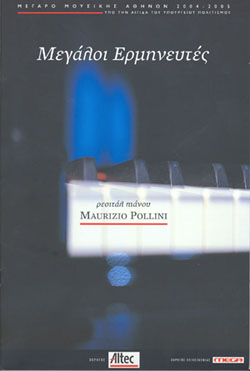Seen and Heard International
Recital Review
Maurizio Pollini in Athens:
Beethoven, Megaron, Athens, 22nd March 2005 (ARi)
Ludwig van Beethoven
Piano Sonata No. 1 in F minor; Op. 2, No. 1 (1793-95)
Piano Sonata No. 3 in C major; Op. 2, No. 3 (1794-95)
Piano Sonata No. 29 in B flat major "Hammerklavier";
op. 106 (1817-18)

It has been more than ten years since Pollini has appeared in
Athens and his recital was much anticipated and, therefore, long
sold-out. As he did back then, he offered us an all Beethoven
program.
By juxtaposing sonatas from both the early and the mature period
of the composer, Pollini offered his audience a variety of mood
and challenging contrasts. This programming concept, combined
with his incomparable musicianship, proved to be highly successful.
Both early sonatas in this recital were treated in a tasteful
and elegant manner and Pollini paid full respect to the texts,
without failing to underline the dramatic aspects of these Mozartian
compositions. The second theme of the First sonata’s initial
movement, together with this same movement’s conclusive
chords, were performed dramatically enough to remind us that the
Appassionata was not far away. The Adagio was poetically
articulated and the impressive final Prestissimo ideally conceived.
The virtuosic Third sonata was a revelation. It does not belong
to my regular listening, and this proved to be a shame. The work
is a masterpiece. Pollini interpreted so expressively the beautiful
themes of the first movement that I started to wonder what various
reviewers mean by, negatively, categorizing Pollini as “restrained”.
It is obvious that this amazing artist will never poison his performances
with excesses and effects which can only distort our idea of what
a composition is meant to convey. Nowadays, in the recording industry
especially, there is a tendency to manufacture such “artists”
as technically equipped, but who then bombard their audiences
with disastrous and vulgar nonsense. The reason behind it is obvious
but I seriously question the value of it. Pollini maintained concentration
throughout the Adagio, whilst its simplicity conquered heart and
soul. With perfect articulation, and marked rhythmical variety,
the finale flowered.
After intermission Pollini launched into the epic “Hammerklavier”
sonata. From the robust introductory notes until the end of the
sonata the audience was left mesmerized. Pollini managed every
aspect of the complicated architecture of the first movement and
made us wonder how much music really advanced after Beethoven
died. The absolute glory came with a monumental interpretation
of the third movement, the most mystical of all the Master’s
compositions. With extremely limited rubato and total engagement,
Pollini invited us to share this rare and uniquely hypnotic experience.
It took some moments to recover and enter the labyrinth of the
Finale which, after a Prestissimo that seemed to enter the abyss,
continued with the miraculous Fuga in Tre Voci. Pollini’s
absolute technical perfection, combined with his impressive musical
intelligence, left his audience speechless and grateful. Pollini
offered a calm Bagatelle as an encore to end a memorable evening.
Alexandros Rigas

